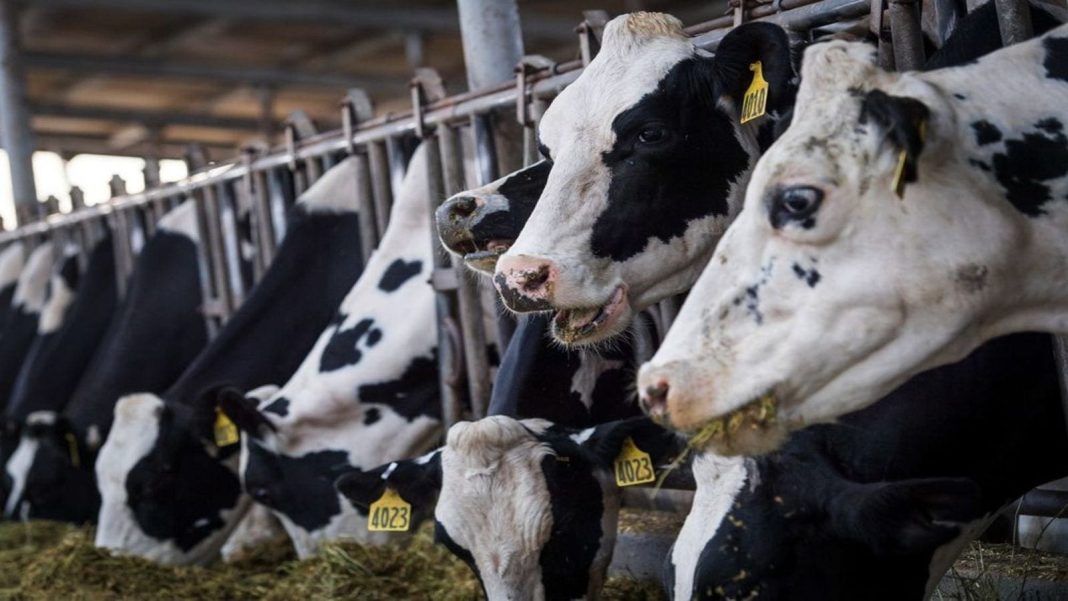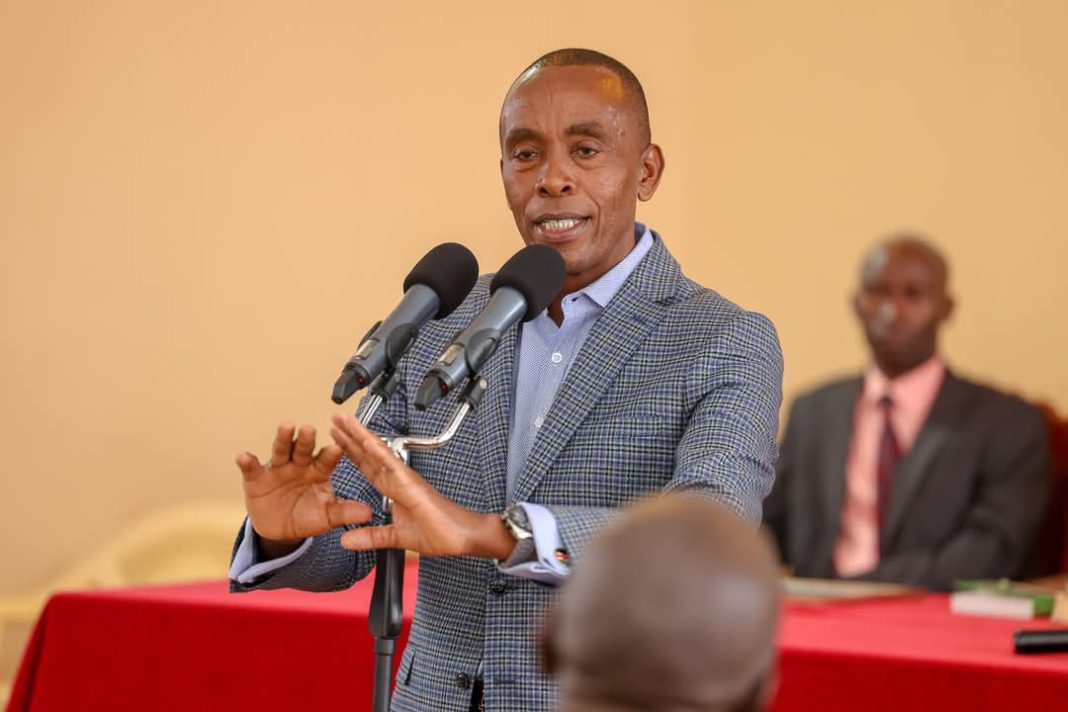Dairy farmers in Kiambu County are decrying rising production costs driven by the high price of animal feed and dwindling market returns.
The farmers, drawn from the Githunguri Dairy Farmers Co-operative Society, say the surge in feed costs has eaten deeply into their earnings, threatening the sustainability of one of Kenya’s largest milk processing co-operatives.
Speaking during the co-operative’s annual general meeting held at Githunguri Stadium, Chairperson John Ndichu said the scarcity of raw materials used to manufacture animal feed has forced processors to source from Tanzania and Uganda, driving costs up.
“Last year, Tanzania banned the export of raw materials to Kenya, while Uganda imposed higher taxes. These developments have drastically increased our cost of production,” said Ndichu.
He added that the fluctuating value of the shilling against the US dollar has worsened the situation, while milk prices in the local market have remained static putting farmers in a tight financial spot.
Farmers called on the national government to step in and ease taxes on animal feed and farm inputs. “We have been suffering for too long. The government should step in and reduce taxes so that we can produce more and sustain our livelihoods,” said John Warui, one of the farmers.
Another farmer, Caroline Wangari, raised concerns over the proliferation of substandard feeds, blaming the high costs for pushing desperate farmers to cheaper, low-quality options that reduce milk production and compromise livestock health.
The Githunguri Dairy Co-operative known for its Fresha milk brand recorded a decline in milk sales for the 2024/2025 financial year, dropping to 91 million kilograms from 92 million the previous year. Consequently, its turnover fell by Ksh2.7 million, down to Ksh10.59 billion.
However, Ndichu remained optimistic, revealing that production had increased by 75,000 litres monthly over the last three months. He added that the co-operative was facing marketing challenges, especially in the international market, citing disruptions in Saudi Arabia, Oman, and Yemen due to regional instability.
“We are now pursuing new markets in Congo and other African countries,” he said, adding that the society currently has 3.95 million kilos of milk in storage as it seeks new outlets.
Farmers are currently paid Ksh49.47 per kilogram of milk, a slight improvement from Ksh49.30 last year.
The co-operative has partnered with international agencies, including the United Nations Industrial Development Organization (UNIDO) and the Swedish International Development Cooperation Agency (SIDA), to strengthen its operations and enhance agribusiness capacity among members.
The partnership will fund the construction of a farmer learning hall, hire extension officers, and provide electric motorcycles, laptops, and dairy cows to boost efficiency and sustainability.
“Our mission remains to empower every farmer to become self-sustaining through agribusiness training and innovation,” said Ndichu.
To cut operational costs, the co-operative has shifted to firewood boilers and upgraded its milk packaging machinery to improve efficiency.







online casino paypal
References:
allasguru.com
casino mit paypal
References:
laboryes.com
The subsequent time I read a weblog, I hope that it doesnt disappoint me as much as this one. I mean, I know it was my choice to learn, but I actually thought youd have something interesting to say. All I hear is a bunch of whining about one thing that you may fix in case you werent too busy looking for attention.
I have the same issue on windows 11. The volume control stays on screen about halfway up, you cannot change
volume, and cannot shut it down very effectively. The recently revamped Sky Sports app
will also become the ultimate home of sports streaming.
Microsoft says it continues to evaluate the impact that AI in search is having on websites
in terms of direct traffic and readership. At the very top
of the page will be an AI-generated answer created by large and small language models that have
reviewed millions of sources to provide the most accurate answer.
When you purchase through links on our site, we may
earn an affiliate commission. It exposes SerpApi’s web search APIs (Google,
Bing, Yahoo, DuckDuckGo, Yandex, Baidu, YouTube, eBay,
Walmart, and more) through a standard MCP interface.
References:
https://blackcoin.co/play-free-slots-%f0%9f%8e%b0-browse-19430-online-slot-games/
These audits verify fair play across all pokies and table games.
Lucky Green understands that Australian players demand banking solutions that work with their lifestyle,
which is why PayID payments take center stage in the platform’s financial
ecosystem. Make sure you’re aware of the details
about deposits, withdrawals, and bonuses before getting started.
However, some minor improvements in support,
payment flexibility and game variety could elevate the overall experience.
Built with HTML5 technology, it delivers smooth navigation and high-quality gameplay,
matching the desktop experience.
Join thousands of players winning big at Lucky Green Casino Australia Feel the rush and embrace your
luck in a setting that values excitement just as much as fair play.
We experienced issues with Lucky Green, but those issues weren’t enough to scare us away.
Becoming a gambler at this casino is as simple as inputting
your information into a form. We love the different features,
and it’s all these options that make the site special.
Access live chat after lucky green casino login through the support icon at the bottom right
of any page. Lucky Green online casino supports multiple banking options
suitable for Australian players, with varying processing times and
limits. Demo mode at lucky green casino allows you to test games without risking real money.
You can access live casino games immediately after completing lucky green online casino registration.
References:
https://blackcoin.co/paris-las-vegas-hotel-casino-adults-only/
„Immortal Romance ist mit seiner düsteren Liebesgeschichte und den mystischen Charakteren mein aktueller Favorit unter den kostenlosen Slots.
Darunter zum Beispiel, mit welchen Gewinnspannen oder RTP-Werten du rechnen kannst oder wie viele kostenlose Spielautomaten uns bisher über den Weg
gelaufen sind. Da die Spielautomaten und Casinospiele genau wie im Echtgeldmodus funktionieren, kann
man sich hier perfekt vorbereiten, um dann sein eigenes Geld einzusetzen.
Im Gratis-Online-Casino spielen bedeutet mehr Vergnügen, ohne Geld zu
verzocken. Du kannst Dich entspannen und auch jene Online-Casino-Spiele genießen, die Du normalerweise spielen würdest.
Große Casinospiele-Gesellschaften schließen die Slots oder alle Online-Slots zuweilen auch kurz
und spielen einen riesigen Jackpot unter allen Spielern aus.
Ein typisches Online-Casino ist eine Website, auf der man sogenannte Glücksspiele spielen kann.
Zusätzlich bieten dir auch viele gute Online Spielotheken die
Möglichkeit, in einer herunterladbaren Software oder im Browser
Casino Spiele kostenlos auszuprobieren, bevor
du dich ans Echtgeldspiel wagst. Erfahren Sie, wie Scatter-Symbole
und weitere Besonderheiten funktionieren, und testen Sie,
auf welchen Einsatzstufen Sie das Spiel spielen wollen oder ob
Sie die Gewinnlinien ändern können.
Casinoonline.de ist Teil der #1 Online Casino Authority®,
dem weltweit größten Casino-Affiliate-Netzwerk.
References:
https://online-spielhallen.de/24-casino-promo-code-alle-wichtigen-informationen-auf-einen-blick/
Thanks , I have just been searching for information about this topic for ages and yours is the greatest I have came upon till now. However, what about the conclusion? Are you positive about the source?
Its wonderful as your other content : D, thankyou for posting.
I’m impressed, I have to say. Actually not often do I encounter a blog that’s each educative and entertaining, and let me tell you, you have got hit the nail on the head. Your thought is outstanding; the issue is one thing that not sufficient persons are talking intelligently about. I’m very joyful that I stumbled across this in my seek for something relating to this.
Its like you read my mind! You appear to know a lot about this, like you wrote the book in it or something. I think that you could do with a few pics to drive the message home a bit, but instead of that, this is excellent blog. A great read. I will certainly be back.
F*ckin¦ awesome things here. I¦m very happy to see your post. Thanks a lot and i’m looking ahead to contact you. Will you kindly drop me a e-mail?